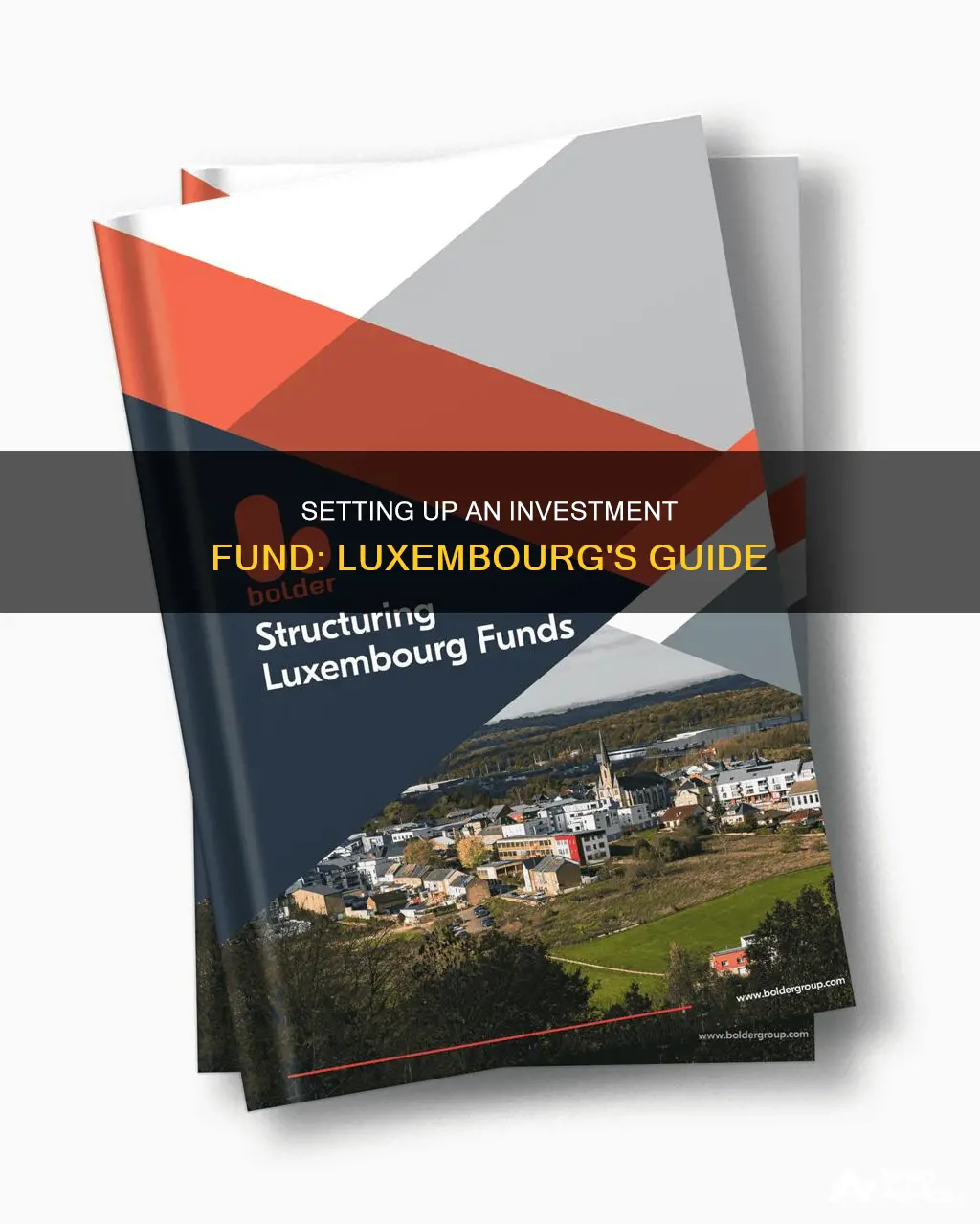
Luxembourg is a top investment destination, both internationally and within Europe. The first investment fund was set up in the country in 1959, and it has since become the largest investment fund centre in Europe and the second largest in the world after the US. The country's strong regulatory environment, economic and political stability, and multilingual, flexible workforce make it an attractive location for investors. Luxembourg's investment funds have a dominant share in both the retail and institutional marketplaces in Europe, and they are the vehicle of choice in many parts of Asia, Latin America, and the Middle East. In this article, we will explore the steps involved in setting up an investment fund in Luxembourg, including the regulatory framework, legal entities, and tax considerations.
What You'll Learn

Regulatory framework
Luxembourg's regulatory framework for investment funds is a key part of its appeal as a financial centre. The country has been developing its regulatory framework, laws, and market strategies to provide one of the best climates for investments and market expansion. The regulatory framework is also favourable for investors, with a high level of investor protection.
The Undertakings for Collective Investments (UCI) are authorised and supervised by the Commission for the Supervision of the Financial Sector (CSSF). The Undertakings for Collective Investment in Transferable Securities (UCITS) are also supervised by the Financial Sector Supervisory Commission, ensuring the highest possible investor protection.
The Alternative Investment Fund Managers Directive (AIFMD) is another key piece of legislation, directly regulating the activities of the managers of the local investment funds and ensuring a high level of investor protection. The AIFMD is applicable to all AIFMs managing AIFs registered in Luxembourg or in another state, regardless of whether the domicile country is an EU member state or not. AIFMs have a set of legal obligations, including registering with the CSSF, providing constant information to the CSSF regarding the instruments they trade and the exposures they face, and informing the CSSF if they no longer meet the threshold stipulated for the assets under management they hold.
The Specialised Investment Funds (SIF) are regulated by the SIF Law (Law of 13 February 2007), which was modified under the AIFMD regime by the Law of 12 July 2013. The legislation stipulates that the SIF structure needs the authorisation of the CSSF. Once the fund begins its activity, it must conduct reporting procedures to the CSSF, in accordance with local procedures.
The Reserved Alternative Investment Fund (RAIF) is another investment vehicle in Luxembourg. The Luxembourg Law of July 23, 2016 ("RAIF law") introduced the RAIF, which is not subject to CSSF approval prior to launch. RAIFs are only managed by an external authorised AIFM and this must be detailed in the notarial certificate and registered in the official RAIF list held by the Luxembourg trade and companies register. RAIFs can be transformed into a regulated fund at a later stage.
The Undertakings for Collective Venture Capital Investments (SICAR) are generally incorporated as a public limited company by qualified investors and must be supervised by the Luxembourg Financial Market Authority (CSSF). The SICAR in Luxembourg needs the approval of the CSSF, and any changes to the structure of the fund must be reported to the institution for new approval.
The Common Contractual Fund (FCP) must be managed by a Luxembourg Management Company, while the Investment Company with Variable Capital (SICAV) and the Investment Company with Fixed Capital (SICAF) can also be managed by a management company, but it is not mandatory.
A Guide to Investing in SBI Nifty Index Fund
You may want to see also

Tax advantages
Luxembourg is a top investment destination, with a stable investment market and a highly developed legislative framework. The country is the largest investment fund centre in Europe and the second largest in the world.
- Luxembourg has a favourable regulatory system and tax advantages.
- Undertakings for Collective Investment in Transferable Securities (UCITS) are liable to pay a subscription tax of 0.05% (or 0.01% for specific categories of UCITS).
- Undertakings for Collective Venture Capital Investments (SICAR) are exempt from income tax (as long as the income is derived from transferable securities), withholding tax, subscription tax, capital duty, and VAT (charged for management services). SICARs must pay a corporate income tax of 24.94% and benefit from the provisions of double tax treaties.
- The Reserved Alternative Investment Fund (RAIF) is exempt from income tax for certain categories of income (investments outside risk capital portfolios and income obtained from transferable securities), withholding tax, subscription tax for investments in risk capital, and VAT on management services. The corporate income tax rate is 24.94%, and the subscription tax is 0.01%. RAIFs can benefit from double tax treaties depending on the fund type.
- European Long-Term Investment Funds (ELTIFs) and Pan-European Personal Pension Products (PEPPs) are exempt from paying subscription tax.
- Part II funds benefit from the same tax rules as UCITS funds.
- Specialised Investment Funds (SIFs) with registered/authorised AIFM are taxed in the same way as UCITS and Part II Funds. However, the subscription tax is charged at a rate of 0.01% (with full exemption for SIFs operating as money market funds or pension funds).
- Retail funds are subject to a subscription tax of 0.05% and are exempt from corporate income tax and withholding tax.
- Luxembourg has a high concentration of expats, foreign employees, and investors, aided by the use of English as a commonly used language in the business sector.
- The country has a strong regulatory environment and an accessible and responsive regulator, benefiting fund managers as a jurisdiction of choice.
- Luxembourg has long-standing stability in economic, legal, tax, political, and social factors, making it an attractive location for fund setup.
- The country's strategic location at the heart of Europe and its traditional openness to cross-border integration have established it as a major international financial centre.
- As an AAA-rated economy, Luxembourg has sound public finances and is politically and socially stable, making it a great place to work and do business.
Unlocking Potential: Investing in the LFRIx Fund
You may want to see also

Investor protection
Luxembourg is a leading global investment fund centre, with a strong focus on investor protection. The country's investment funds are considered best-in-class when it comes to investor protection, with asset managers typically establishing UCITS funds with a global distribution strategy.
The Undertakings for Collective Investment in Transferable Securities (UCITS) is a globally recognised brand in the investment fund world. UCITS have strict rules to limit the risk that investors are exposed to. These include limits to the eligibility of assets, risk diversification rules, and prohibitions on certain techniques and instruments. For example, UCITS cannot invest in asset classes such as real estate, private equity or commodities, and are precluded from acquiring precious metals. Additionally, the portfolio of UCITS must be well-diversified, with no more than 10% of net assets invested in securities from a single issuer.
The regulatory framework for UCITS is provided by the 2010 Law, which defines UCITS as an undertaking whose sole object is collective investment in transferable securities and/or other liquid financial assets, with capital raised from the public, operating based on the principle of risk-spreading, and whose units are, at the request of investors, repurchased out of the undertaking's assets.
The 2010 Law also sets out criminal sanctions for breaches, including fines between EUR 500 and EUR 50,000, or imprisonment of three months to two years, for investing monies without the relevant fund being entered on the list by the Commission de Surveillance du Secteur Financier (CSSF).
The CSSF is the Luxembourg financial regulator, and it approves and registers UCITS. It also maintains official lists of UCITS and Part II funds, which can be consulted on the regulator's website.
In addition to UCITS, Luxembourg offers other fund structures that provide investor protection, such as the Alternative Investment Fund (AIF) and the Undertakings for Collective Venture Capital Investments (SICAR). AIFs are subject to the Alternative Investment Fund Managers Directive (AIFMD), which includes rules for the protection of investors in hedge funds, private equity funds, real estate funds, and other AIFs.
Luxembourg also has a strong focus on responsible investing, with investors increasingly considering their behaviour and a growing interest in long-term and responsible savings products.
Mutual Funds for NRIs: Best Indian Investment Options
You may want to see also

Fund domiciliation experts
Luxembourg is a top investment destination, both internationally and within Europe. The country has a highly developed regulatory framework, laws, and market strategies, making it one of the best climates for investments and market expansion. Luxembourg is the largest investment fund centre in Europe and the second largest in the world after the US. It is also a leading centre for alternative asset classes.
Luxembourg's investment funds have a dominant share in both the retail and institutional marketplaces in Europe. They are also the vehicle of choice in many parts of Asia, Latin America, and the Middle East. Luxembourg's strategic location at the heart of Europe and its traditional openness towards cross-border integration have established it as a major international financial centre.
The Grand Duchy of Luxembourg has a high concentration of expats, foreign employees, and investors. The multilingual climate is aided by the three national languages, to which English is added as a commonly used language in the business sector.
Luxembourg offers a wide range of investment opportunities, particularly building on the strength of three pillars: UCITS, Alternative Investment Funds (AIFs), and Responsible Investing (RI).
Luxembourg provides a large pool of fund domiciliation experts. The country's financial regulator is very reliable and flexible, and its legislation for investments is designed to benefit both local and foreign investors, offering a high level of protection.
The process of setting up an investment fund in Luxembourg can be supported by fund domiciliation experts, who can advise on the specific laws and regulations concerning the set-up and functioning of an investment vehicle. These experts can also provide assistance with fund administration, fund management, and legal compliance for any chosen investment vehicle.
The cost of incorporating a Luxembourg Investment Fund can start as low as €25,000 for the "lightly regulated" funds, with running costs starting from €20,000 per year. The overall costs will depend on factors such as the assets under management, the need for a depository bank, audit requirements, marketing, and reporting.
How Fed Funds Rate Cuts Impact Investment Decisions
You may want to see also

Investment fund types
Luxembourg offers a wide range of investment opportunities, with three pillars: UCITS, Alternative Investment Funds (AIFs), and Responsible Investing (RI).
Undertakings for Collective Investment in Transferable Securities (UCITS): UCITS are best-in-class for investor protection and are established with a global distribution strategy. They are highly regulated and supervised by the Commission de Surveillance du Secteur Financier (CSSF). UCITS funds can be set up as a single fund or an umbrella fund with several compartments. The minimum capital requirement is EUR 1.25 million, which must be reached within six months of authorisation.
Alternative Investment Funds (AIFs): AIFs are often set up by corporations, public organisations, and financial service providers for various purposes, such as hedging risks or investing in specific areas like real estate, private equity, or niche markets. AIFs can be structured as single funds or umbrella funds with multiple compartments. The AIFM Law governs AIFs, and they must be approved by the CSSF and appoint an Alternative Investment Fund Manager (AIFM). AIFs managed by an EU-authorised AIFM can benefit from an EU product passport for cross-border marketing. The minimum capital requirement is the same as for UCITS.
Reserved Alternative Investment Funds (RAIFs): RAIFs combine the advantages of various fund regimes and are a type of AIF managed by an authorised AIFM. They are not subject to prior CSSF approval, reducing time-to-market. RAIFs can be structured as single or umbrella funds and must have a minimum of EUR 1.25 million in net assets within 12 months of authorisation. Only 5% needs to be paid upon subscription.
Specialised Investment Funds (SIFs): SIFs can invest in a wide range of financial instruments, including private equity, real estate, securities, or bonds. The SIF Law and AIFMD regime govern SIFs, and they require CSSF authorisation. Once active, SIFs must conduct reporting procedures to the CSSF.
Undertakings for Collective Venture Capital Investments (SICARs): SICARs are typically incorporated as public limited companies by qualified investors and supervised by the CSSF. They must have a minimum share capital of EUR 1 million, obtained within 12 months of incorporation. SICARs benefit from simplified procedures for issuing new shares and can be listed on the stock market, depending on their business form.
Other types of funds available in Luxembourg include life insurance funds, unregulated funds, securitisation vehicles, and more.
Index Funds: Global Investing Strategies for Diversified Portfolios
You may want to see also
Frequently asked questions
Luxembourg is the largest investment fund centre in Europe and the second largest in the world. It has a favourable regulatory system, tax advantages, a large pool of fund domiciliation experts, a high level of investor protection, and a wide range of investment funds.
The main categories of funds to register in Luxembourg are Undertakings for Collective Investments (UCIs), Undertakings for Collective Investment in Transferable Securities (UCITS), Alternative Investment Funds (AIFs), and Undertakings for Collective Venture Capital Investments (SICAR).
To start a Luxembourg fund as a SICAR, you must obtain approval from the CSSF for the fund's activities and its directors, have a capital of EUR 1 million obtained within 12 months of incorporation, and set it up as a public limited company, special limited company, or private limited company.
UCITS funds must have a minimum capital of EUR 1.25 million, which must be obtained within six months of authorisation.
A RAIF combines the positive characteristics and structuring flexibilities of various fund regimes. They are not subject to CSSF approval prior to launch, which shortens the time-to-market. A RAIF's net assets cannot be less than EUR 1,250,000, which must be reached within 12 months of authorisation, and only 5% is required to be paid up on subscription.







